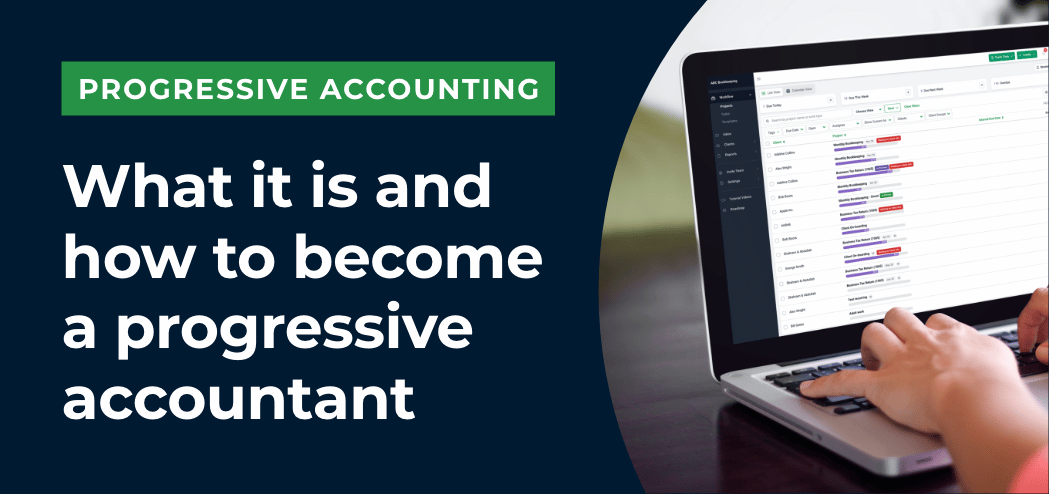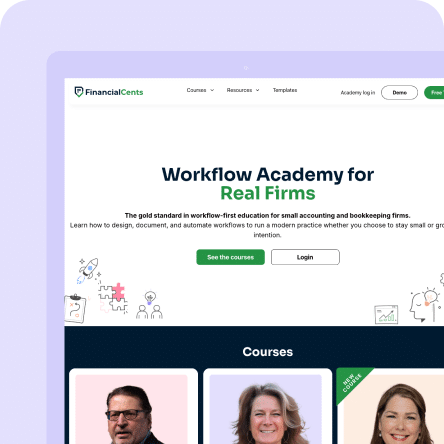Whether you run a profitable firm or struggle to survive in 2025 will depend on how much you understand (and leverage) changing client needs and expectations.
Here’s why.
Not long ago, businesses needed accountants mainly for compliance and reporting obligations. But today, most businesses expect their accountants to help with cash flow, growth advisory, and tax planning—besides their core accounting functions.
These, and developments in technology, fall outside the domain of traditional accounting. Consequently, only a progressive approach will help accounting firms stay ahead of client needs, and build the right skills and systems to future-proof their services.
Traditional Versus Progressive Accounting Firms
Traditional accounting firms offer core accounting services (bookkeeping and tax preparation). They are more inclined to use proven methods and tools to manage client work.
On the other hand, progressive accounting firms thrive on combining technology and human input to manage work and create positive experiences for their clients and employees.
Because they rely on technology (to handle manual, repetitive tasks), progressive accounting firms are more productive, efficient, and accurate. This allows them to focus on finding better ways to look after their clients’ current and evolving needs.
Why You Need A Progressive Accounting Firm
With frequent regulatory and technological changes in the accounting industry, your services can become outdated quickly.
Within the last five years alone, accounting firms have had to adjust to changing business requirements, including:
- Clients undergoing digital transformation
- Qualifying businesses for stimulus and relief packages
- Changing work culture
Clients Undergoing Digital Transformation
The number of businesses moving online since the global pandemic has increased drastically. This change created an opportunity for progressive accounting firms to help these businesses:
- Examine where they might suffer financial leakages to eliminate the threat by reallocating funds.
- Forecast cash flow and adjust their budgets to stay afloat through the transition.
- Guide clients during contract negotiations with suppliers.
Qualifying Businesses for Stimulus and Relief Packages
Following the economic effects of COVID-19, national governments took measures to reduce the financial burden on individuals and businesses.
In the United States of America, for example, the government passed the Coronavirus Aid, Relief and Economic Security (CARES) Act.
The CARES Act aimed to help businesses manage payroll and overhead expenses through loans, guarantees, and employee retention credits.
Business owners needed to meet the requirements (which can be hard to understand) to access these benefits.
For example, the Paycheck Protection Program (PPP) applied to businesses with fewer than 500 employees. But such businesses must spend 60% of the loan on payroll, and their average number of full-time employees must be equal to or above the number for the previous year.
Accounting firms helped these businesses to
- Understand these requirements to benefit from the relevant relief packages.
- Update their accounts to access the relief packages.
If your firm can’t help them with those, you risk losing your clients to progressive accounting firms who are swift enough to offer those developing services.
Changing Work Culture
Every progressive accounting firm owner needs to be able to:
- Maintain visibility over who’s working on what and where client work stands.
- Communicate and collaborate with your staff to meet client deliverables.
None of these was much of a problem when everyone worked out of the office. But being forced to run a remote work (virtual accounting) model, most accounting firms needed to think about visibility and collaboration differently. The progressive accounting firms were swift enough to adopt firm management software for accounting to maintain work quality, client engagement, and capacity planning across their distributed teams.
This allowed them to stay ahead of the curve instead of constantly struggling to catch up.
You should read this, if you’ve ever wondered “Can accountants work from home?”
How You Can Build A Progressive Accounting Firm in 2025.
Here are some ways to start building a progressive accounting firm for 2025.
- Identify Your Ideal Customer
- Zero in on a Niche
- Hire and Retain Suitable Talents
- Scout Your Current Clients’ Network for Your Ideal Clients
- Make Clients Trust and Feel Your Support
- Become a Thought Leader
- Streamline Work with Technology
1. Identify Your Ideal Customer
If you’ve been around the accounting industry for a while, you must have had your share of difficult clients. Having too many of them will run your firm to the ground.
Scaling your firm needs you to dedicate most of your resources to serving the most profitable clients—whatever your profitability metric is.
Your ideal clients may be in the same industry, age bracket, and social or economic class, but don’t worry if they are not. Besides, you will likely have multiple ideal client personas for the different client profiles.
A clearly defined ideal client persona makes your marketing efforts more targeted–and effective.
To start, look into your current clientele for your most profitable clients.
Are they in the same role, industry, or age bracket? The more of these details you have, the higher your chances of making meaningful impacts and adjusting your offerings to stay relevant to your clients.
2. Zero in on a Niche
Business owners are increasingly looking for frictionless reporting, compliance, and business processes.
Specializing in a sector (like real estate, restaurants, or construction) or an aspect of accounting (tax, transaction accounting, or audit and assurance) helps you master the specific skills your ideal clients need. This increases your chances of satisfying existing clients and winning new ones.
You’ll be able to follow developments in one area to remain relevant to your clients as their needs evolve.
Identify your area of strength and build your expertise around it. You will need to find ways to gracefully phase out your current clients that do not fit the bill.
3. Hire and Retain Suitable Talents
Delivering satisfactory services depends on the people you assign to the client’s work.
Your team should comprise persons with core accounting proficiency and all the other skills your firm needs to deliver excellent client experience. This cuts across managing client work, implementing technology, and building client relationships.
These talents are available, but whether you can attract and retain them is the problem.
Hiring and retaining the best accounting talents is not rocket science. It boils down to having some, if not all, of these
-
A Progressive Accounting Company Culture
Your company culture will either make your firm a delight to your employees or the opposite. Either way, it will reflect on your client service.
While your firm’s culture ultimately depends on everyone in your team to work, it is your responsibility to set the tone for the values that guide your firm.
That includes how your firm handles communication, diversity, teamwork, and employee engagement and development.
-
Adequate Employee Remuneration
While the best accounting talents are driven by growth and impact, they also do not want to live pay check to pay check.
Apart from reducing the chances of getting poached by other firms, adequate employee compensation allows them to focus on looking after their clients.
-
Growth Opportunities
They are the best talents because they are hungry for career growth and success. The best employees will not stick around for long if you cannot give them the opportunities to advance their careers.
Besides, empowering your employees benefits your firm first-hand. Their new accounting skills will show in the quality of work your clients will enjoy.
Giving your employees the opportunities to take accounting courses, attend accounting conferences and providing opportunities to take on complex projects are ways to help your employees grow.
-
Flexible Work
If you don’t give your employees a flexible working environment, you will find it hard to retain your current employees. Let alone attract new ones.
For example, realizing that employees are just as productive in a remote work system has made remote work more popular among employees.
While remote work might be the loudest realization of flexible work coming out of the pandemic, flexible work is much more than a remote versus onsite work model.
It also includes a shorter workweek and flexible start-and-finish time.
4. Scout Your Current Clients’ Network for Your Ideal Clients
If birds of a feather flock together, your current clients are most likely hanging out (networking in the same communities, taking the same courses, and attending the same conferences) with similar business owners.
Find out where (online and offline) your most profitable clients hang out and insert yourself in those places to meet similar business owners.
A referral program for your existing clients is another option. Once your service is satisfactory, they will likely tell their friends about your services. Creating incentives for referring clients doubles your chances of getting referrals.
The incentives could include free or reduced fees for clients who refer their friends to your firm.
5. Make Clients Trust and Feel Your Support
Client communication helps progressive accounting firms meet client deliverables faster. That is why many accountants fall into to trap of trying to impress their clients with financial jargon. But this approach is self-defeating.
Most business owners know next to nothing about the accounting side of their businesses, and this frightens most of them. Using technical terms can be intimidating and will impact your relationship negatively.
But communicating with your clients in simple, authentic, and professional ways makes you more understandable, approachable, and supportive. Which will improve the quality of your client relationship in the long term.
6. Become a Thought Leader
People only do business with firms they know and trust. Your existing and potential clients are asking tons of questions every minute.
They want to know about
- How to finance their business.
- How to structure their business.
- Whether to separate business and personal accounts.
- How to predict trends in their customers’ needs.
- And countless other things.
Sharing knowledge that helps clients resolve their day-to-day business challenges demonstrates your expertise and improves your chances of winning new clients and retaining old ones.
7. Streamline Work with Technology
Without the right accounting workflow software, your team will struggle to manually manage work, people, and other repetitive tasks from sun up to sun down. This will keep you from planning and scaling your firm from a traditional to a progressive accounting firm.
But with a practice management solution, you can automate as many processes as possible, from workflow management to client relationships to time tracking and billing.
This will free up your resources to anticipate client needs, follow industry trends and optimize your services to benefit from emerging opportunities.
You may be interested in:
Start Building A Progressive Accounting Firm With Financial Cents
The global pandemic, among other factors, has shown the level of changes possible in the accounting industry. And things will never remain the same again.
A progressive approach to running your accounting firm is the only way to track emerging trends to remain relevant to your current and potential clients.
But you can’t build a progressive accounting firm if your team is constantly overwhelmed with manual processes like time tracking, workflow, and client management.
Financial Cents helps accounting firms manage work (especially the manual, repetitive accounting processes). Its features include workflow management, which allows you to:
- Create recurrences to have projects automatically repeat on a schedule you set.
- Automate dependencies so that every team member knows when their tasks are due in work with multiple assignees.
- Manage team capacity to ensure none of your team is overworked
- Know what each employee is working on at all times to prevent time wastage.
- Time Tracking; to measure client and employee profitability with an inbuilt timer that you can start-and-stop, pause and resume as you clock in and out of a client’s work.
- Client Relationship Management tab to store client information so that your team can access it on the go. It also gives you a complete history (audit trail) of each client’s interactions with your firm to personalize their services.






